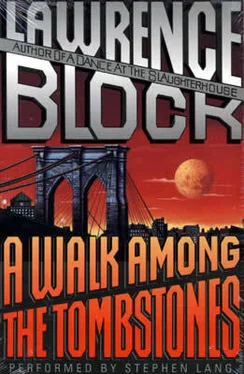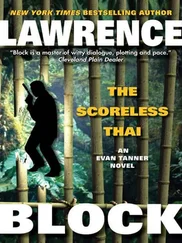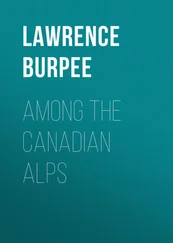Lawrence Block
A Walk Among the Tombstones
for LYNNE
Baby, baby, naughty baby
Hush, you squalling thing, I say
Peace this moment, peace, or maybe
Bonaparte will pass this way
Baby, baby, he’s a giant
Tall and black as Monmouth steeple
And he breakfasts, dines and suppers
Every day on naughty people
Baby, baby, if he hears you
As he gallops past the house
Limb from limb at once he’ll tear you
Just as pussy tears a mouse
And he’ll beat you, beat you, beat you
And he’ll beat you all to pap
And he’ll eat you, eat you, eat you
Every morsel snap snap snap!
ENGLISH LULLABY
On the last Thursday in March, somewhere between ten-thirty and eleven in the morning, Francine Khoury told her husband she was going out for a while, she had marketing to do.
”Take my car,” he suggested. ”I’m not going anywhere.”
”It’s too big,” she said. ”Time I took it, I felt like I was steering a boat.”
”Whatever you say,” he said.
The cars, his Buick Park Avenue and her Toyota Camry, shared the garage behind their house, a mock-Tudor structure of half-timbered stucco on Colonial Road between Seventy-eighth and Seventy-ninth streets, in the Bay Ridge section of Brooklyn. She started up the Camry, backed out of the garage, triggered the remote unit to close the garage door, then backed all the way out to the street. At the first red light she popped a classical cassette into the tape deck. Beethoven, one of the late quartets. She listened to jazz at home, it was Kenan’s favorite music, but classical chamber music was what she played when she drove.
She was an attractive woman, five-six, 115 pounds, built large on top, narrow at the waist, trim in the hips. Dark hair, lustrous and curly, combed back off her face. Dark eyes, and aquiline nose, a generous, full-lipped mouth.
The mouth is always closed in photographs. She had, I understand, prominent upper incisors and a substantial overbite, and anxiety over this feature kept her from smiling much. In her wedding pictures she is beaming and radiant, but her teeth remain invisible.
Her complexion was olive, and her skin tanned deeply and readily. She already had a start on the summer’s tan; she and Kenan had spent the last week of February on the beach at Negril, in Jamaica. She’d have been darker, but Kenan made her use sunscreen and limited her hours of exposure. ”It’s not good for you,” he told her. ”Too dark’s not attractive. Lying in the sun’s what turns a plum into a prune.” What was so good about plums, she wanted to know. They’re ripe and juicy, he told her.
When she had driven half a block from her driveway, about the time she reached the corner of Seventy-eighth and Colonial, the driver of a blue panel truck started his engine. He gave her another half-block lead, then pulled out from the curb and followed after her.
She turned right at Bay Ridge Avenue, then left again at Fourth Avenue, heading north. She slowed when she reached the D’Agostino’s at the corner of Sixty-third Street, and eased the Camry into a parking space half a block past it.
The blue panel truck passed the Camry, circled the block, and parked at a fire hydrant right in front of the supermarket.
When Francine Khoury left her house, I was still having breakfast.
I’d been up late the previous night. Elaine and I had had dinner at one of the Indian joints on East Sixth Street, then caught a revival of Mother Courage at the Public Theater on Lafayette. Our seats weren’t great and it was hard to hear some of the actors. We would have left at intermission, but one of the actors was the boyfriend of one of Elaine’s neighbors, and we wanted to go backstage after the final curtain and assure him that he was wonderful. We wound up joining him for a drink at a bar around the corner that was absolutely packed for no reason I could fathom.
”That was great,” I told her when we got out of there. ”For three hours I couldn’t hear him onstage, and for the past hour I couldn’t hear him across the table. I wonder if he’s got a voice.”
”The play didn’t last three hours,” she said. ”More like two and a half.”
”It seemed like three hours.”
”It seemed like five,” she said. ”Let’s go home.”
We went to her place. She made coffee for me and a cup of tea for herself and we watched CNN for half an hour and talked through the commercials. Then we went to bed, and after an hour or so I got up and dressed in the dark. I was on my way out of the bedroom when she asked me where I was going.
”Sorry,” I said. ”I didn’t mean to wake you.”
”That’s all right. Can’t you sleep?”
”Evidently not. I feel wired. I don’t know why.”
”Read in the living room. Or put the TV on, it won’t bother me.”
”No,” I said. ”I’m too restless. The walk across town might do me good.”
Elaine’s apartment is on Fifty-first between First and Second. My hotel, the Northwestern, is on Fifty-seventh between Eighth and Ninth. It was cold enough out that at first I thought I might take a cab, but by the time I’d walked a block I wasn’t feeling it.
Waiting for a light to change, I happened to catch a glimpse of the moon between a couple of tall buildings. It was just about full, and that didn’t come as a surprise. The night had a full-moon feel to it, stirring tides in the blood. I felt like doing something and couldn’t think what.
If Mick Ballou had been in town I might have gone over to his saloon looking for him. But he was out of the country, and a saloon of any sort was no place for me, as restless as I was feeling. I went home and picked up a book, and somewhere around four I turned the light off and went to sleep.
By ten o’clock I was around the corner at the Flame. I had a light breakfast and read a newspaper, giving most of my attention to the local crime stories and the sports pages. Globally we were between crises, so I wasn’t paying much attention to the bigger picture. The shit really has to hit the fan before I take an interest in national and international issues. Otherwise they seem too remote and my mind refuses to come to grips with them.
God knows I had time for all the news, and the want ads and legals, too. I’d had three days’ work the previous week at Reliable, a big detective agency with offices in the Flatiron Building, but they’d had nothing for me since, and the last work I’d done on my own hook had been ages ago. I was all right for money so I didn’t have to work, and I’ve always been able to find ways to get through the days, but I would have been glad of something to do. The restlessness I’d felt the night before hadn’t passed with the setting of the moon. It was still there, a low-grade fever in the blood, an itch somewhere down beneath the skin, where you couldn’t scratch it.
Francine Khoury spent half an hour in D’Agostino’s, filling a shopping cart in the process. She paid cash for her groceries. A bag boy loaded her three shopping bags into her cart and followed her out of the store and down the street to where her car was parked.
The blue panel truck was still parked at the hydrant. Its rear doors were open, and two men had emerged from it and were on the sidewalk, apparently studying something on a clipboard one of them was holding. When Francine passed them, accompanied by the bag boy, they glanced in her direction. By the time she had opened the trunk of the Camry, they were back in the truck with the doors closed.
The boy put the bags in the trunk. Francine gave him two dollars, which was twice what most people gave him, to say nothing of the surprisingly high percentage of shoppers who didn’t tip him at all. Kenan had taught her to tip well, not ostentatiously but generously. ”We can always afford to be generous,” he had told her.
Читать дальше












